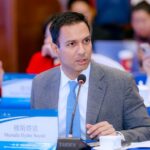UNITED NATIONS: A senior Pakistani diplomat has called for a “concerted campaign” to recover all weapons from terrorist groups like Tehreek-e-Taliban Pakistan (TTP), which reportedly uses safe havens in Afghanistan to launch deadly cross-border attacks inside Pakistan.
“Pakistan is particularly concerned at the acquisition and use of modern and sophisticated small arms by the terrorist groups such as TTP — a UN-listed terrorist organization,” Ambassador Munir Akram said in remarks at the 4th Conference to review the implementation of the UN Programme of Action (UNPoA) on Small Arms and Light Weapons (SALW).
The 2001 UNPoA, which was backed by all member states, provides the framework for activities to counter the illicit trade in small arms and light weapons. Since then, the UN has worked to support the implementation of the UNPoA at national, regional, and international levels.
“Terrorists and criminals do not manufacture these arms,” the Pakistani envoy told delegates, pointing out they acquire them from illicit arms markets or receive them from entities that want to destabilize a particular region or country.
“It is essential to investigate how terrorist groups and criminal organizations acquire such sophisticated weapons,” Ambassador Akram said. “It is the responsibility of all States and the UN to take measures to prevent illicit trade, transfer and diversion of these arms.”
He also said that the illicit proliferation, excessive accumulation and misuse of small arms and light weapons continue to exacerbate conflicts, fuel terrorism, threaten peace and security and erode sustainable development, with hundreds of thousands of human lives lost each year, terrible suffering inflicted on civilians, and economies and societies devastated.
“The evolving nature of conflicts and the advent of new technologies pose new challenges to combat the proliferation of increasingly lethal small arms — UAVs and drones,” the Pakistani envoy said.
The UNPoA and the International Tracing Instrument (ITI), he said, represent an enduring international consensus and agreed framework to address challenges associated with the unauthorized, illicit trade and trafficking in these arms.
In this regard, Ambassador Akram said the current review conference offers an important opportunity to assess progress, identify challenges, and chart the way forward.
Pakistan, he said, has strengthened its legislative frameworks, enhanced transfer controls, and implemented robust measures to prevent the diversion of SALW to unauthorized users, including safe and secure stockpile management, comprehensive marking, tracking and record keeping.
But Ambassador Akram said a supply-side approach alone to tackle the SALW challenges, adding, “To reduce demand, more strenuous efforts and resources are required to resolve and end conflicts in various regions and sub-regions, end terrorist activities, and eliminate organized crime.”
International assistance and cooperation to build national capacities in tracking and interdiction will be central to the implementation of the UNPoA, he said.
Opening the discussion, Izumi Nakamitsu, the head of our Office for Disarmament Affairs (ODA), delivered remarks on behalf of the UN Secretary-General, Antonio Guterres.
In the remarks, the UN chief said the review conference arrives at a difficult and dangerous moment for humanity with global military expenditures on the rise. He added there is nothing “small” or “light” about the damage these weapons cause.
Source: APP




